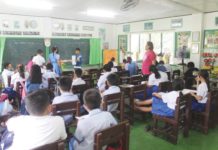
THE SCENE was both hopeful and telling when the Iloilo Provincial Government and the Department of Health kicked off the School-Based Immunization (SBI) Program in Bingawan town. Health workers, teachers, and local officials worked hand in hand to vaccinate Grade 7 students against measles, rubella, tetanus, and diphtheria. For these children, the shots were both a dose of protection and proof that public health can and should reach every learner, regardless of where they live.
But access to health services is not always equal in a province where many schools are tucked away in remote barangays. Parents in urban centers may find it easier to bring their children to clinics or hospitals, but in rural areas, distance, poverty, and lack of transportation often stand in the way. This is where the SBI program shows its true value: by bringing immunization directly to schools, it removes the barriers that keep rural children from the protection they deserve. Vaccination, after all, is not a privilege reserved for the accessible — it is a right owed to every child.
Ensuring equity, however, goes beyond logistics. It requires commitment. Local governments and health offices must guarantee that no school is skipped, no barangay left unvisited, and no learner overlooked. A lapse in just one far-flung community could expose entire populations to outbreaks. For diseases as contagious as measles or rubella, leaving even a small group unprotected is a risk that ripples outward. Iloilo’s resilience against preventable diseases depends on how well it serves its most geographically and economically disadvantaged residents.
Equity also means providing clear information and reassurance to parents. Vaccine hesitancy can be as dangerous as inaccessibility especially in rural areas where misinformation can spread unchecked. Barangay officials, teachers, and health workers must work together not only to deliver the vaccines but to build trust in them. When a mother in a remote sitio hears directly from her child’s teacher or the local nurse that the vaccine is safe, her confidence grows far more than from posters or pronouncements alone.
Iloilo has taken the right step in deploying vaccination teams to schools across the province, but this effort must be sustained and strengthened. Rural access cannot be treated as an afterthought; it must be the very measure of success. For what good is a health program that leaves behind the very children most at risk?
Equity is the true test of any public health campaign. Iloilo’s children — whether they live in the poblacion or in the remotest upland barangay — deserve the same shield against disease. Public health is strongest when it leaves no one behind.







